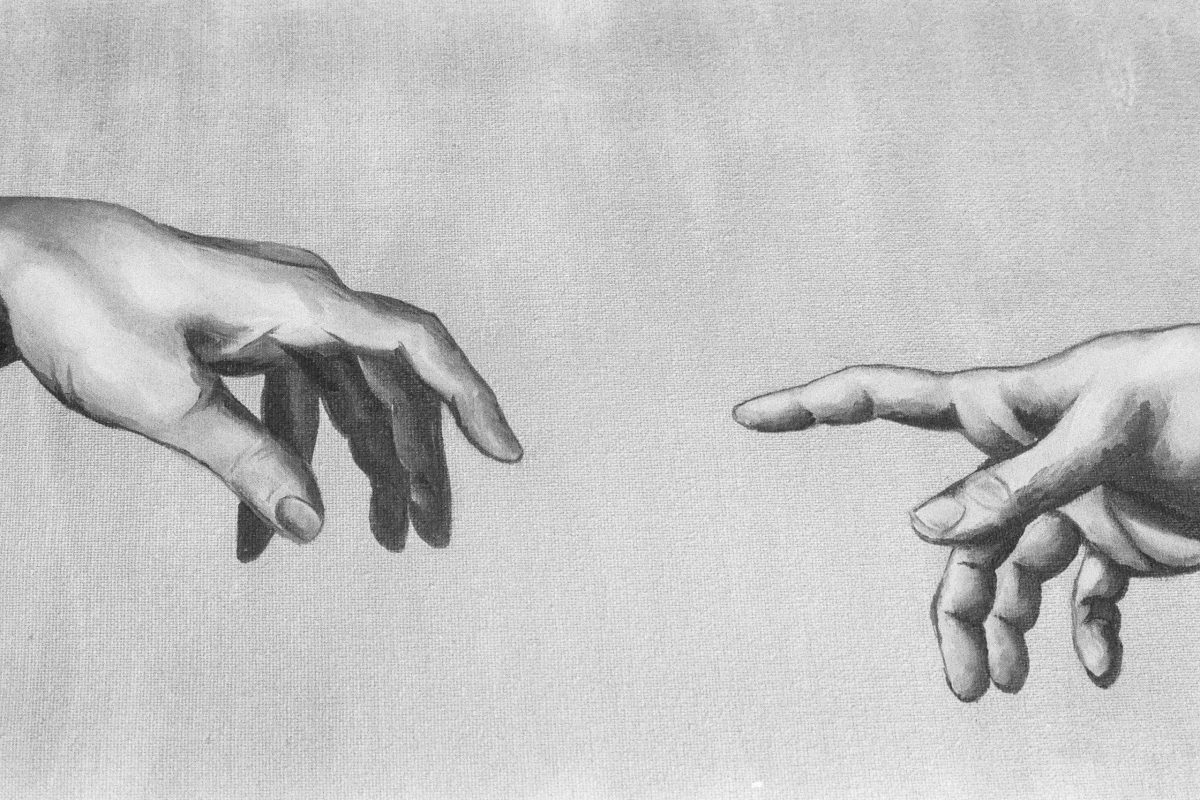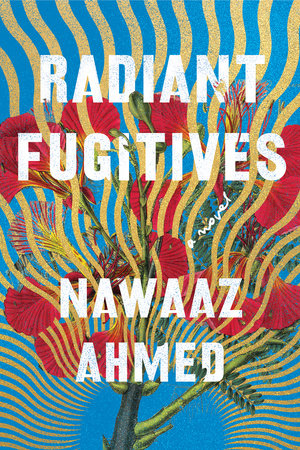interviews
An Indian Muslim Family Is Torn Apart by Religion, Homophobia, and Politics
Nawaaz Ahmed, author of "Radiant Fugitives," on the expectations placed upon immigrant writers

Electric Lit is just $4,000 away from our year-end fundraising goal of $35,000! We need to hit this target to get us through the rest of 2025, and balance the budget for 2026. Please give today! DONATE NOW.
Nawaaz Ahmed has a particular talent for fiction that captures the spaces in between distant bodies. When we were both MFA students at the University of Michigan a decade ago, he saw a pair of construction cranes moving high above the street and said, I want to write a short story about those cranes that will never meet. He saw longing in the empty sky between them and, unintimidated by that vast space, he chose to write inside it.
His debut novel Radiant Fugitives, described as “a fearless exploration of the clash between identity, sexuality, and religion,” glides across spaces in between disconnected poles—between queerness and Islam, between family and public life, and between politically divided Americans.
The book takes place in Obama-era San Francisco over the course of five days. It’s the last week of Seema’s pregnancy and the women in her family have come to help. But this is not a joyful gathering—years ago, when Seema came out as lesbian to her Indian Muslim family, she was exiled by her father and rejected by her devout sister, Tahera. Their mother is now terminally ill and so, by her insistence, the three women have come together in an emotionally volatile reunion.
Those circumstances might constitute a heady enough challenge for some writers to tackle, but in Nawaaz’s work, yet more thickens the stew: the book is narrated by Seema’s unborn baby, Ishraaq. He speaks in precise prose layered through with the poetry of John Keats, Obama’s speeches and verses from the Quran. It’s a tightly plotted—and yet lushly rendered—tinderbox of a novel.
As fellow Muslims and immigrants, Nawaaz and I have often talked about the fraught dissonances that we explore in our fiction. So we were both intrigued by Sanjana Sathian’s recent essay about respectability and the “good immigrant novel.” In our conversation, we talked about the expectations placed upon immigrant and Muslim writers, and falling in love with characters who don’t always love us back.
Roohi Choudhry: This is a book of so many layers. There are layers of American identity politics and the dawning of the Obama era. And then, intimate relationships—between a baby and his mother, between sisters, lovers. Poetry is another layer, too. So how did you decide to interlace all these threads?
Nawaaz Ahmed: The ways that the book deals with various themes and layers have to do with our ways of seeking. Poetry is a way—the seeking of art. Politics is seeking a particular cause. And faith. I saw that as three main ways in which we seek meanings in our life.
Once we stop believing in God, then what replaces it?
Tahera embodied art and faith. This kind of exploration of what faith does for our selves and what do we do when we have lost faith, or we don’t have access to faith. I mean, once we stop believing in God, then what replaces it? At least at that time, because I was interested in writing, it seemed like art was the one thing that spoke to me directly. And then developing Seema’s character, I realized that art wasn’t speaking to Seema. She had to find something else. She tries to find it in various causes and moves from cause to cause.
I would have liked to title my book “ways for our searching” but it didn’t work out. I think Radiant Fugitives is the same thing in a way—I see fugitives as being these people searching for something. How do we search for this light in our lives?
RC: Over the years, we’ve talked about feeling pressured to write our complex stories in a minimalist way and feeling constrained by that expectation. And that also reminded me of what Chimamanda Ngozi Adichie says about the danger of the single story. So, has minimalism been a pressure? And how has that affected how you think about the book?
NA: I was definitely trying to capture the complexity of this world. I did not want these characters to become defined by “she’s gay,” “she’s Muslim,” “he’s Black.” I definitely didn’t want that kind of single story for these characters. Because one of the themes of the book is just how complex the world is, how vast the universe is and all these things that are impacting us at any given moment. We are dealing with our personal selves in this very political world.
RC: That complexity of the universe makes me think about the Sanjana Sathian essay. And this term that she used about minority authors expected to be “cultural tour guides”—she pushes back against the idea. I’ve definitely felt that frustration too: people in workshops saying, “I always learn so much from your work.” So, since you’re showing the world as complex, was it challenging to show all of these complexities without becoming a cultural tour guide?
NA: There is a tour guide.
RC: Oh yeah? The baby?
NA: The baby is definitely a tour guide, but he’s not the tour guide for “let me explain this culture,” or “let me tell you something about Islam.” But through his eyes, he does lead you to some of these things that I wanted to explore— the role of love, faith, art, politics, causes.
If I have to be this tour guide, let me be a tour guide to show America to my mother, rather than show the Islamic community to American readers.
The narrator does go into the specifics of various things, but I was hoping that in the ways he approaches the tour guiding, that there were universal things that he was pointing to, rather than this is how you pray. There’s a whole paragraph about namaz that just talks about the various positions. And you could think of that, I guess, as some way of providing information. But I saw it as here is a ritual that has its terms and has its space. The more important part of that is not these particular terms but the fact that all these people are doing it. At least I hope that’s how it comes across. What’s important is that they’re all engaged in this, in this particular time. And there’s a sense of community and a sense of belonging in that.
RC: That’s definitely how it comes across. I’m wondering if the whole cultural tour guide issue is a function also of what gaze we’re writing for. Reading your book, I never felt that this was meant for someone else’s gaze. I never felt that this was not for me. That’s a rare feeling as a Muslim reader. Was that something you’ve been considering as you went?
NA: Four or five years ago, Matthew Salesses asked me, who is your audience? If there is one person you would put at the center, who would it be? And I had to say it would be my mother. The book is written in a way for my mother. And so, there are certain things I do not have to explain. The thing that I had to explain more is the American politics, because that’s what she knows the least about. And of course, a lot of readers, including my editor, resisted. Like, “we know all this.” I’ve had various readers say that. And I felt like that was very important for me to keep in the book because my mother doesn’t know all this.
And so, if I have to be this tour guide, let me be a tour guide to show America to my mother, rather than show the Islamic community to American readers. I think my focus has been, how do I explain what’s happening in the US? What does it mean to be living in the US as an immigrant? How do I describe that experience to the family that I’ve left behind? That was one of my main preoccupations, rather than the other way around.
RC: That’s very beautiful and refreshing. Because there are so many other books that might have characters who look like us, but they’re not written for us. So that’s one of the things I love most about your book.
Going back to that essay, Sathian also talks about this issue of “dirty laundry”—that the white American gaze demands that marginalized writers air their community’s “dirty laundry.” I wondered if that expectation came up for you?
NA: I’ve been thinking about that, and it has definitely colored the book. And maybe this isn’t the thing for a “true artist” to say, there’s this idea that true artists have to be focused on the telling of the truth and the telling of the truth includes dirty laundry. And I believe in that, to a certain extent. But I also question the use of the word “truth.” The writer has an author’s perspective and that’s what they’re airing, and to call it the truth, I think, is giving it a bit more power than that.
What was important to me is to describe what is happening, but also, allow the reader to be able to see through other perspectives. So, we can talk about how Islam, for example, deals with homosexuality—I don’t know if that qualifies as dirty laundry. But definitely, it’s there in the book and people may be like, “Oh my god, look at how she’s treating her sister.” That bigotry is definitely there. But it was important to me to use a narrator who will not judge it but will present it giving Tahera as much fairness and respect as he can.
RC: Yes, and as we’re talking I’m questioning—what is dirty laundry, what does that actually mean for this context? Because I don’t think that queerness is the dirty laundry. And I think that’s an important question for us as Muslim writers to think about, rather than take it for granted or let others define it. Speaking for myself, the dirty laundry to me is Tahera’s reactions. Her bigotry. I could imagine that showing this darker side of the book’s most devout Muslim character might feel really hard in this post-Trump era. There’s a sense in the community of “we’ve gone through enough.” And it feels like there’s a pressure to show very positive aspects of being devout and so then, this whole darker side of religiosity falls to the wayside.
NA: I think there are two aspects to dirty laundry. One is that I am not airing it. There is already a conception of Islam as being homophobic. In the news, you hear things like what happened with ISIS, the stoning of homosexual men in Iran. There are these things that are already there in the world. And we have to deal with it.
Also, people in the US might say: “we are not fundamentalist Muslims and we should not be tarred by the same brush.” Then we are slipping into the danger of the single story—that all Muslims are going to be tarred by how Tahera is portrayed. I think the fear of airing dirty laundry seems to come partly from that fear. So, we have that in the background, I think, and I can see why someone here would not want to have the burden of all that on them.
So, in writing Tahera’s character, you get into this area of how do you not speak for all Muslims. What I tried to do is make Tahera so individual, her reasons for how she acts and even her anger is not just completely based on faith. It stems from her history, it stems from this whole pressure that she’s feeling about how she feels ill-treated in America. To attribute it to just religion or just one aspect of her character is reductive. And these reactions are not only because of religion, but there’s this whole complex world that is putting pressure on the characters, or on us. It’s not like “this is Islam’s dirty laundry,” but this is how we are as human beings.
RC: I want to talk about Tahera more. I mean, she’s such a difficult character, right? I felt so many emotions towards her. All your characters are complex, but she seems especially so, and I felt sympathy and a lot of resistance towards her. That’s perhaps why I brought her up with that whole dirty laundry thing because as I was reading, I thought, well, the reality is I do know people like her in my family. I can imagine them reacting the same way—like her reactions to Fiaz, or to homeless men on the street—it was familiar and hard. And I wondered how it was to write someone like that.
NA: The biggest fear that I had is that I was being unfair to Tahera. I needed to be able to see why she acts that way. And I think I put the most amount of pressure on Tahera—she leaves her family, she comes to a place where even her dress is a symbol. And she feels like neither Seema nor her mother would accept her for who she is, as much as she has a problem accepting them. I have a lot of sympathy for that.
The hope is maybe we’re not trapped in this harsh world where people are always going to be unkind to each other.
The world is not very kind to outsiders. And there is a big backlash in the US—the reaction to Obama, and Trump’s win and evangelical pushback—even though Trump is not particularly religious or moral, we have a huge section of that population supporting him. I think that comes from a sense of being threatened. And of feeling like you have been cast out in some way. And that is something which I wanted for Tahera, too. That kind of outsiderness that Tahera feels when she goes to this liberal neighborhood and this liberal city is part of why she finds herself resisting so many things. And that does not make her likable.
RC: Still, Tahera is a character whose beliefs are bigoted towards you, the writer. And how is that? To spend years with this woman. I don’t know if I could do it.
NA: Part of writing the character was to actually deal with it. Deal with the fact that there are people like that— people who I know or love because they are family. One of the reasons to write the book is to explore what that actually means for myself.
I see Tahera also on a journey in the book. My hope is that if there had been other circumstances, Tahera could grow and make other choices. The hope is that we are all acting out of our best intentions and that we are being derailed in some cases by circumstances. Because if not, the alternative that we are forever trapped in this harsh and ugly world is terrifying.
The hope is maybe we’re not trapped in this harsh world where people are always going to be unkind to each other. And that there may be some ways in which we can come together.
Because people change, people do, maybe not in five days. But hopefully over a lifetime. And we have to have that possibility.









